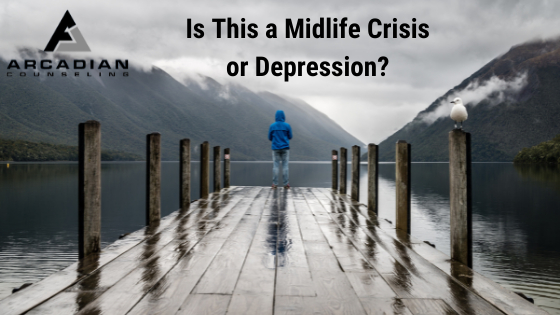If you’ve recently found yourself wondering if you’re struggling with a midlife crisis or depression, it’s time to figure it out so you can get started on the right path to being the best version of you and your life.
It’s pretty common to confuse the symptoms of a midlife crisis with depression or vice versa. But remember: the big differentiating factor is the frequency in which these feelings arise.
If you’re struggling with depression, it’s very likely the symptoms are present on a daily regular basis. They’ve likely been around for six months or longer. However, a midlife crisis will have periods where there are no symptoms present at all when you simply feel fine.
Clinical depression however is a chronic, often biologically-based mood disorder, while a midlife crisis is not.
One way to look at a midlife crisis is that it’s a conflict between one’s own perception of themself and the life they think they have and what/where/who they want to be. It’s often born out of a desire to change our own identity.
Someone between the ages of 40 and 55 who is content with their life can certainly experience depression, but typically won’t experience a midlife crisis.
Common Symptoms of a midlife crisis

Whether you’re dealing with a midlife crisis or depression, it’s important to understand that action is necessary to get through it.
The most common age for a midlife crisis is 35 to 55. While there is often an overlap of symptoms between a midlife crisis or depression, and they can both experienced at the same time. It’s important to know if you’re struggling with is a midlife crisis or depression.

A strong sense of a lack of fulfillment in life is present whether you’re experiencing a midlife crisis or depression.
- A lack of fulfillment in life
- Intense feelings of nostalgia, chronic reminiscence about the past
- Feelings of boredom, emptiness and meaninglessness
- Impulsive and often rash decisions and actions
- Dramatic changes in behavior and appearance
- Marital infidelity or constant thoughts about infidelity
- Constantly comparing oneself to others, who seem happier or more fulfilled
- Intense feelings of regret
Men often experience a loss of sex drive, erectile dysfunction, decreased levels of testosterone and feelings of sadness. However, sadness in a midlife crisis is significantly less intense than when it occurs during clinical depression.
Common symptoms of depression

Midlife crisis or depression? Depression is more likely to have thoughts of death and dying and chronic feelings of emptiness/apathy.
- Changes in sleep habits, either insomnia or sleeping too much
- Changes in appetite
- Intense, sometimes debilitating feelings of sadness
- Feelings of guilt and worthlessness
- Lack of interest or enjoyment in previously enjoyed activities (very common)
- Diminished sex drive
- Isolation behaviors
- Increased levels of anxiety, fear and worry
- Increased irritability and anger(typically in men)
- Crying spells and uncontrollable emotions (typically in women)
- Thoughts of death, dying, and self harm
- Unexplained aches and pains
Depression can occur at any age. It can occur at any time regardless of satisfaction or contentment in life. While depression that occurs in midlife is certainly affected by external situations like career and family, it’s a disorder of the nervous system which creates a chemical imbalance in the brain.
Depression isn’t something that one can create on their own or simply will away on their own either. It typically requires a multi-faceted approach which often includes, therapy/counseling/coaching, medication, and life changes.
A midlife crisis essentially involves one’s own questioning of their current life circumstances, their life up to this point, and the direction they feel they are headed. Successfully resolving a midlife crisis means making peace in one’s life and making changes to get more satisfaction out of life.
Dealing With Midlife Crisis or Depression

Whether you’re dealing with a midlife crisis or depression, it’s important you have someone to talk to who can be objective and supportive.
Coping with a midlife crisis is challenging because it feels like our mind is screaming at us that something is terribly wrong at it must be corrected immediately. There is a sense of urgency and the feeling that time is running out – which drives people to make rash and sometimes disastrous decisions such as cheating on a spouse or suddenly quitting a job or changing careers.
- Slow down and don’t make rushed decisions. Making a change just to make a change is not a good approach. The bigger the decision, the more thought needs to be given to it.
- Talk to someone. Struggling with a midlife crisis often feels lonely and isolating. Find someone in your inner circle who you trust to give objective feedback and support to talk to. If you don’t have anyone, find an awesome therapist you like and trust.
- Get connected to reality. Remember: feelings aren’t facts. Just because you feel a certain way, doesn’t necessarily mean this is reality. While your emotions are very real, they could be based on assumptions and misinterpretations. Find a way to get some objectivity.
- Be kind to yourself. Would you want the kind of friend who tells you to shut up and stop being such a whiner? Doubtful. So why do that to yourself? If you’re considering quitting your job, ending a relationship be kind to others as well in your approach. Remember that no matter what, your connections and the people in your life contribute greatly to the quality of it. Burning bridges isn’t smart.
Neither a midlife crisis or depression is something to be taken lightly. They can be debilitating and life altering. If you’re struggling with either one, or you’re not sure what you’re struggling with, find an awesome life coach or therapist near you to help you navigate through.
James Killian, LPC is the Principal Therapist & Owner of Arcadian Counseling in New Haven, CT where they specialize in helping over-thinkers, high achievers, and perfectionists reduce stress, increase fulfillment and enhance performance so they can move From Surviving To Thriving.

